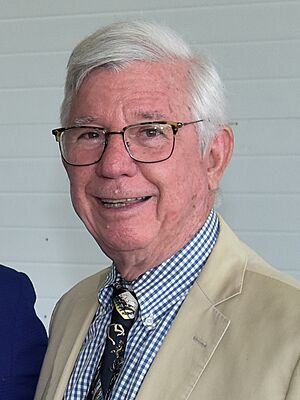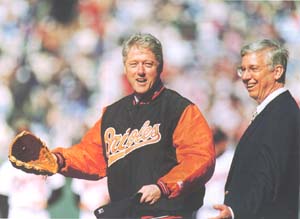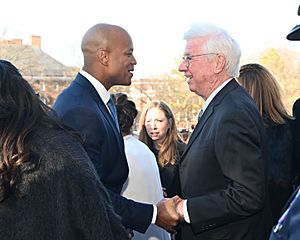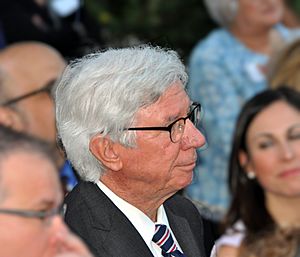Parris Glendening facts for kids
Quick facts for kids
Parris Glendening
|
|
|---|---|
 |
|
| 59th Governor of Maryland | |
| In office January 18, 1995 – January 15, 2003 |
|
| Lieutenant | Kathleen Kennedy Townsend |
| Preceded by | William Donald Schaefer |
| Succeeded by | Bob Ehrlich |
| Chair of the National Governors Association | |
| In office July 11, 2000 – August 7, 2001 |
|
| Preceded by | Mike Leavitt |
| Succeeded by | John Engler |
| 4th Executive of Prince George's County | |
| In office 1983–1994 |
|
| Preceded by | Lawrence Hogan |
| Succeeded by | Wayne K. Curry |
| Personal details | |
| Born |
Parris Nelson Glendening
June 11, 1942 New York City, U.S. |
| Political party | Democratic |
| Spouses | Lynne Shaw (divorced 1970s) Frances Hughes
(m. 1976; div. 2001)Jennifer Crawford
(m. 2002) |
| Education | Broward College Florida State University (BA, MA, PhD) |
| Signature | |
Parris Nelson Glendening (born June 11, 1942) is an American politician and teacher. He served as the 59th Governor of Maryland from 1995 to 2003. Before that, he was the county executive for Prince George's County, Maryland, from 1982 to 1994. He is a member of the Democratic Party.
Contents
Early Life and Education
Parris Glendening was born in The Bronx, New York City. When he was young, his family moved to Florida. He went to St. Thomas Aquinas High School in Fort Lauderdale. He received a scholarship to attend Broward Community College.
He later went to Florida State University. There, he earned three degrees: a bachelor's degree in 1964, a master's degree in 1965, and a PhD in 1967. He was the youngest student at Florida State University to earn a doctorate in political science.
After finishing his studies, he became a professor. He taught government and politics at the University of Maryland at College Park for 27 years. In 1977, he also co-wrote a book called Pragmatic Federalism: An Intergovernmental View of American Government.
Starting in Local Politics
Glendening began his work in public service in 1973. He was elected as a city councilman in Hyattsville, Maryland. This town is a suburb near Washington, D.C.
In 1974, he was elected to the county council for Prince George's County, Maryland. He served as the chairman of this council twice. In 1982, he became the county executive for Prince George's County. He was the first county executive in Maryland to be elected for three terms, serving from 1982 to 1994.
Under his leadership, Prince George's County was recognized as an "All America County." This award came from the National Civic League. A magazine called City and State Magazine also named him the "most valuable county official" in the nation.
Governor of Maryland
Winning Elections
Parris Glendening was elected as the governor of Maryland for his first term. He won by a very small number of votes against Ellen Sauerbrey. She was the candidate from the Republican Party.
Glendening became the first Maryland governor from the Washington, D.C., area since 1867. In 1998, he won re-election for a second term. He defeated Ellen Sauerbrey again, this time by a larger margin.
Key Actions as Governor

During his first term, Governor Glendening focused on several important areas. These included improving higher education, protecting the environment, and helping the economy grow. He also worked on tax reform.
From 1994 to 1998, he cut or lowered more than 50 different taxes in Maryland. This included the state's personal income tax. By the end of his first term, Maryland's ranking for creating new jobs improved a lot.
Glendening especially worked to bring biotechnology companies to Maryland. He wanted Maryland to be a leader in this field. He helped bring companies like Human Genome Sciences and Qiagen to the state. As of June 2014, Maryland had the second-largest number of biotech companies per person in the U.S.
He also helped bring two professional football teams to Maryland. The Washington Redskins moved from Washington, D.C., to Landover, Maryland. The Baltimore Ravens moved from Cleveland, Ohio, to Baltimore. Glendening personally worked out the agreements with the team owners. He then worked to get new stadiums built for both teams.
During his second term, Glendening focused more on the environment. He worked on issues related to the Chesapeake Bay. He also addressed concerns about too much development in rural areas. Glendening is known for creating the idea of "Smart Growth." This idea helps communities grow in a way that protects the environment and uses land wisely.
In 2001, Maryland lawmakers passed a bill that Glendening supported. This bill made it illegal to treat people unfairly because of their sexual orientation. Glendening signed this bill into law.
Governor Glendening also took action on the death penalty. While he oversaw two executions in 1997 and 1998, he stopped all executions in Maryland in 2002. He did this with an executive order. His successor, Robert Ehrlich, later lifted this ban. However, the next governor, Martin O'Malley, brought the ban back. In 2013, Maryland officially ended the use of capital punishment.
Glendening could not run for governor again in 2002 because of term limits. His lieutenant governor, Kathleen Kennedy Townsend, ran instead. She lost the election to Republican Robert Ehrlich.
After Being Governor

Parris Glendening left office on January 15, 2003. After leaving office, he mostly stayed out of the public eye. He continued to support his work on Smart Growth.
In 2006, he endorsed Kweisi Mfume for the U.S. Senate. Glendening did not attend the inauguration of Governor Martin O'Malley in 2007. He was out of town for a planned speaking event.
Personal Life
Parris Glendening has been married three times. He divorced Frances Hughes Glendening in 2001. They have a son named Raymond.
He married Jennifer E. Crawford in 2002. She was his chief of staff at the time. They have a daughter named Gabrielle, who was born in August 2002. This was the first time since 1879 that a Maryland governor had a baby born while in office.
Glendening's brother, Bruce, passed away in 1992. Glendening considers University Park, Maryland, his hometown. This town is close to the University of Maryland at College Park campus.
Electoral History
| Party | Candidate | Votes | % | |
|---|---|---|---|---|
| Democratic | Parris Glendening (incumbent) | 846,972 | 55.14 | |
| Republican | Ellen Sauerbrey | 688,357 | 44.82 | |
| Party | Candidate | Votes | % | |
|---|---|---|---|---|
| Democratic | Parris Glendening | 708,094 | 50.21 | |
| Republican | Ellen Sauerbrey | 702,101 | 49.78 | |
| Party | Candidate | Votes | % | |
|---|---|---|---|---|
| Democratic | Parris Glendening | 293,314 | 53.59 | |
| Democratic | American Joe Miedusiewski | 100,296 | 18.32 | |
| Democratic | Melvin Steinberg | 82,308 | 15.04 | |
| Democratic | Mary Boergers | 46,888 | 8.57 | |
| Democratic | Don Allensworth | 15,680 | 2.87 | |
| Democratic | Walter Gilchrist Finch | 5,369 | 0.98 | |
 | Aaron Henry |
 | T. R. M. Howard |
 | Jesse Jackson |


